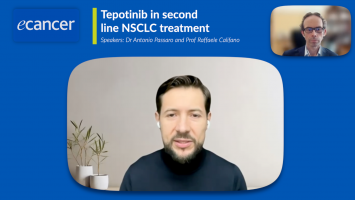SIOG 2015
Elders versus youngers: stage III non-small cell lung cancer
Dr Regina Gironés - Hospital Lluis Alcanyis, Valencia, Spain
We reviewed our database registry that started at our hospital in 2004 to select those patients that have been treated with concurrent chemo and radiotherapy in stage 3 lung cancer in clinical practice because few patients, few elderly patients, are in the randomised studies of concurrent chemo and radiotherapy.
Concurrent chemoradiotherapy is a powerful modality so why were you looking at comparing that with younger and older patients?
We compared if the chemotherapy we used concomitant with radiotherapy has an impact in overall survival because the standard of care is cisplatin combination but less elderly patients are suitable for cisplatin combination.
What did you find?
We found that it seems that it doesn’t matter the kind of chemotherapy you use. We found that the most important thing is the total dose of radiotherapy you treat to the patient.
What are the clinical messages coming out of this for doctors?
Probably our clinical message is first you have to apply an approach, a geriatric approach because all our elderly patients were based on a geriatric approach and then if the patients are fit [?? 1:27] able, no frail patients, you can choose the kind of chemotherapy to treat them. It doesn’t matter if you don’t use cisplatin to combine with radiotherapy.
Let me get an understanding of this, then. You might have a situation where you would be reluctant to use a harsh therapy on older patients but are you saying now that you can go ahead?
Yes, probably they benefit from concurrent chemo and radiotherapy but with adapted regimens similar to palliative treatment.
So you’d avoid cisplatin maybe?
No, carboplatin. I prefer carboplatin for elderly patients.
What, then, if you were to summarise the findings for cancer doctors, what should they remember from this study?
You don’t have to avoid concurrent chemo and radiotherapy only by age criteria, they benefit from concurrent chemoradiotherapy. But probably you have to adapt the chemotherapy schedule you use for elderly patients.
And in practical terms up to what sort of age are you talking about?
In practical terms you can use either cisplatin or carboplatin or prefer carboplatin to concomitant.
And is there an age limit for going ahead with chemoradiotherapy?
I’m not sure if there’s an age limit but we found in clinical practice that there was a younger elderly population, the median age for elderly was only 73, so probably more than 80 years old it’s difficult to avoid full concurrent chemo and radiotherapy.








